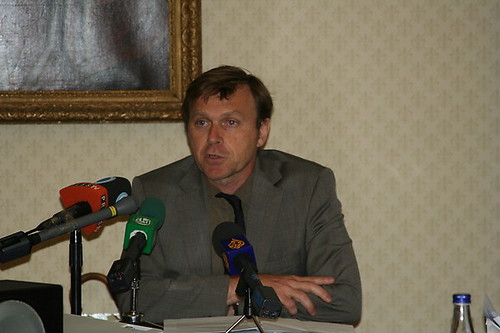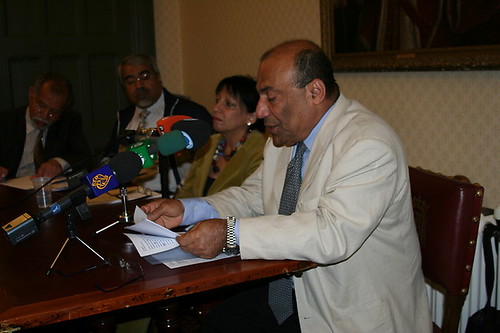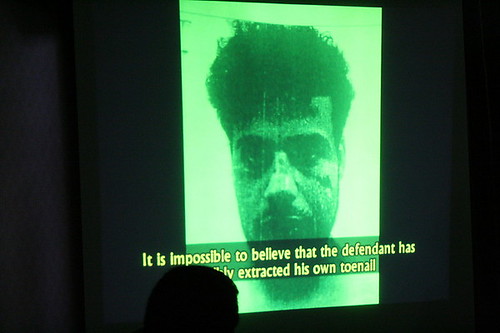
Report by Karen Dabrowska, in London (mathaba)
A reversion to torture and attempts to alter Bahrain’s demographic balance were highlighted at a London seminar held at the beginning of August in the House of Lords.
The seminar, chaired by Baroness Falkner of Margravine of the Foreign Affairs Committee of Parliamentarians for the Liberal Democrats, marked the annual anniversary of the country’s independence and the dissolution of the only legitimate parliamentary experience in 1975.

Report by Karen Dabrowska, in London (mathaba)
A reversion to torture and attempts to alter Bahrain’s demographic balance were highlighted at a London seminar held at the beginning of August in the House of Lords.
The seminar, chaired by Baroness Falkner of Margravine of the Foreign Affairs Committee of Parliamentarians for the Liberal Democrats, marked the annual anniversary of the country’s independence and the dissolution of the only legitimate parliamentary experience in 1975.

Tom Porteous, Director Human Rights Watch summarised the findings of the NGO’s latest report Torture Redux: The Revival of physical coercion during interrogation in Bahrain,issued in February 2010.
He pointed out that by the end of the 1990s, Bahrain appeared to have cast off a well-deserved reputation as a country that routinely tortured detainees. The government took significant steps to curtail the use of torture The report concluded, however, that since the end of 2007, officials have again used torture and ill-treatment, particularly during the interrogation of security suspects.
This reversion to past practices came as political tensions rose in Bahrain. Street demonstrations involving young men from the country’s majority Shia Muslim community protesting alleged discrimination by the Sunni-dominated government deteriorated with increasing regularity into confrontations, sometimes violent, with security forces. Arrests often followed. Security officials appear to have utilized a specific repertoire of techniques against many of those arrested designed to inflict pain and elicit confessions.
Mr Porteous told the seminar that France and the United Kingdom have training and assistance arrangements with Bahrain’s Ministry of Interior and may risk being implicated in prohibited practices and violating their own legal obligations if they cooperate with law enforcement forces they know are employing torture or other ill-treatment.
Peter Weatherby of the UK Bar Human Rights Committee observed a number of trials, including the conclusion of the Ma’ameer trial of ten defendants who were charged with the killing of a Pakistani national during a protest.
“I was very pleased to speak to one of the heads of prosecution. I was also able to speak to Under Secretary Tariq Bin Dena and several of his senior staff about the situation. They were very accommodating but I have to report little more than bare denials of the sorts of allegations that I had heard from the families and the detainees themselves”, Weatherby said.
“However it would be difficult to conclude that there was a very significant conspiracy of detainees in all of these special cases to concoct allegations of mistreatment and torture. There were very consistent themes as to the nature of the mistreatment”.
He concluded hat the Bahraini government, has gone to some lengths to present a position whereby they have signed up to very many international human rights instruments. But there is a gulf between the requirements of the conventions and practices in Bahrain and between what the Bahraini law is and the operation of the Bahraini system within that law.

Abdulhadi Khalaf, Senior Researcher, Centre for Middle Eastern Studies & Department of Sociology, LIND University and a former MP in the parliament dissolved in 1975, described the contentious procedure “political naturalization”. This refers mostly to use of royal makramat (privilege) to grant Bahraini citizenship to a disputed number of foreigners.The king continues to rely on naturalization,to achieve a variety of demographic, political and social objectives.
A report published by the International Crisis Group notes that: “Consistent with past practice, the government reportedly is pursuing policies to alter the island’s demographic balance. These include granting citizenship to non-Bahrainis – mainly Sunni Arabs from around the region – to mitigate Shiite dominance. Although there are no published figures for the number of “politically naturalized”, some suggest that as many as 50,000 to 60,000 have been extended citizenship in this way. Exceptional measures appear to have been taken to grant citizenship to Jordanians, Syrians, and Yemenis recruited by the security services and, demographic impact aside, the heavy presence of foreigners in the military and police has provoked sharp anger from locals who consider them ‘mercenaries’”.
Khalaf, concluded that political naturalization in Bahrain is a ticking bomb which could lead to institutionalizing ’differentiated citizenship’, where rights and entitlements are allocated on the basis of group characteristics backgrounds and loyalty to the king. Differentiated citizenship increases constrains against social integration. It also limits incentives to cultivate national cohesion as it links citizenship rights and entitlement to belonging to one or the other of the citizenship categories.
Husain Abdulla, Director, Americans for Democracy & Human Rights in Bahrain told the seminar that many American politicians are being convinced that Shaikh Hamad’s political program is not a program of reform but it is a program of political deception where dictatorship and tyranny are being legitimized.
Congressman James McGovern noted that “Bahrain has taken some initial positive steps, but such progress has often been uneven or even reversed, as in the case of the use of practices of torture, workers’ rights, human trafficking, and representative institutions of government. The nation will take two steps forward and then one step back, or, more regrettably, one step forward and two steps back and I am especially concerned about abuses by security forces, including torture.” Concern about Bahrain’s Human Rights situation is growing in the United States Congress.

A short film about the ordeal of the town of Ma’ameer both in regard to the environmental crisis resulting from pollution from nearby factories and the life imprisonment of seven of residents was shown.[1]
While the seminar was taking place in London protests and demonstrations continued in various parts of Bahrain. The Bahrain Freedom Movement reported that the road leading to the international airport in Muharraq was closed by pro-democracy demonstrators who burnt tyres and disrupted road traffic. Similar protests at the time led to the closure of the Hamad Town Highway that leads to the Saudi-Bahraini causeway.
View all photos of the event on BCHR flickr channel
Source: http://www.mathaba.net/news/?x=624215
[1] The short film on youtube:http://www.youtube.com/watch?v=RunfnIeRdjU